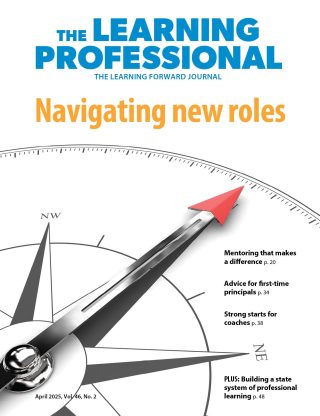IDEAS
Put learning in high gear
Coherence accelerates literacy curriculum goals
By Jeremy Avins, Nathan Huttner and Sherrill C. Miller
June 2019
Vol. 40, No. 3
Read the remaining content with membership access. Join or log in below to continue.
Sed ut perspiciatis unde omnis iste natus error sit voluptatem accusantium doloremque laudantium, totam rem aperiam, eaque ipsa quae ab illo inventore veritatis et quasi architecto beatae vitae dicta sunt explicabo. Nemo enim ipsam voluptatem quia voluptas sit aspernatur aut odit aut fugit, sed quia consequuntur magni dolores eos qui ratione voluptatem sequi nesciunt. Neque porro quisquam est, qui dolorem ipsum quia dolor sit amet, consectetur, adipisci velit, sed quia non numquam eius modi tempora incidunt ut labore et dolore magnam aliquam quaerat voluptatem.
References
Brown, F. (2019). How systems can support high-quality curricula [Blog post]. Available at blogs.edweek.org/edweek/learning_forwards_pd_watch/2018/02/how_systems_can_support_high-quality_curricula.html.
Choi, J., Richman, S., & Dolfin, S. (2018). Sustaining effective teacher practice. Princeton, NJ: Mathematica Policy Research.
Krajcik, J. & Delen, I. (2017). The benefits and limitations of educative curriculum materials. Journal of Science Teacher Education, 28(1), 1-10.
Kramer, P. (2015). Meet East Ramapo’s new schools chief, Deborah Wortham. The Journal News. Available at www.lohud.com/story/news/education/2015/10/08/meet-dr-deborah-wortham/73592866.
National Center for Education Statistics. (2016). 2015-16 Public School District Directory. Available at nces.ed.gov/ccd/elsi.
Steiner, D. (2017). Curriculum research: What we know and where we need to go. Washington, DC: StandardsWork.
Taylor, K. (2015). Team from New York Education Department to study troubled East Ramapo Schools. The New York Times. Available at www.nytimes.com/2015/08/14/nyregion/education-dept-appoints-team-to-study-east-ramapo-school-district.html.
TNTP. (2015). The Mirage. New York, NY: Author.
Wake County Public School System. (2018). District facts. Available at www.wcpss.net/domain/100.
Wiener, R. & Pimentel, S. (2017). Practice what you teach. Washington, DC: The Aspen Institute.
Recent Issues
BUILDING BRIDGES
December 2024
Students benefit when educators bridge the continuum of professional...
CURRICULUM-BASED PROFESSIONAL LEARNING
October 2024
High-quality curriculum requires skilled educators to put it into...
LEARNING TO PIVOT
August 2024
Sometimes new information and situations call for major change. This issue...
GLOBAL PERSPECTIVES
June 2024
What does professional learning look like around the world? This issue...












